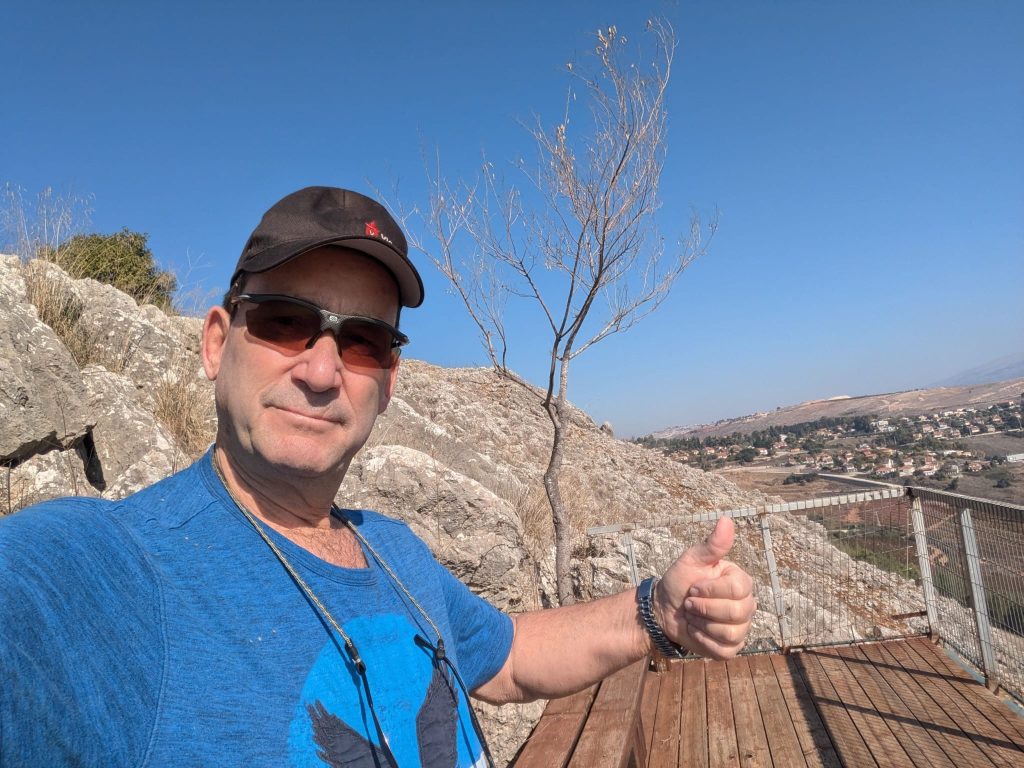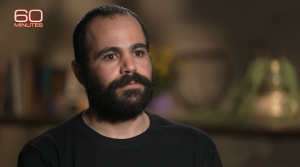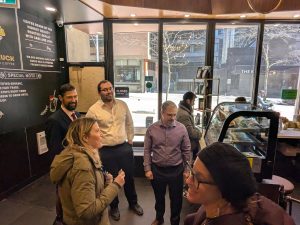The last time Nir Zamir went back to check on the status of his abandoned home in Metula was three months ago. The retired furniture maker and his wife Michal are among the more than 60,000 evacuees from northern Israeli border communities who were ordered to leave after Oct. 7, 2023, when Hezbollah terrorists began raining deadly rockets into Israel from Lebanon in a show of solidarity with Hamas.
Since then, the Zamirs have been living in a government-funded hotel in Tiberias, except for occasional trips to Edmonton to visit two of their children and five grandchildren, who live in the Alberta capital.
But this January, while Nir chose to extend his visit in Canada indefinitely, Michal moved back on her own to stay for a while at the couple’s house in Metula, where they’ve lived and raised their family for nearly 40 years.
“I came back because I have [had] enough of the hotel. I couldn’t stay any longer in the little room,” Michal, 63, said in a podcast interview March 16 with The CJN Daily. “It’s my house, and I like to sit on my couch and see the TV and do whatever I want.”

On March 1, the Israeli government officially told the northern evacuees to return home for good. Although a ceasefire with Hezbollah that went into effect in late November has now expired, the IDF has kept soldiers stationed in five areas inside Lebanon to make sure things remain quiet. And earlier this month, Israeli officials signalled they will open direct diplomatic talks with Lebanon to work towards a normalization of relations between the longtime deadly enemies.
But husband Nir, who’s also 63, isn’t convinced it’s safe to move home, despite his wife’s optimism, and despite the crucial financial incentives being made available from the Netanyahu government for returnees to northern communities.
“You have a better couch in Canada,” said her husband. “Because this agreement between Israel [with] Hezbollah is so breakable, we [could] come to the same situation that we were in before the war. In the long term, Hezbollah can do anything it wants in two minutes, in three minutes, and we will be almost in the same situation that we were stuck in the south.”
Indeed, six rockets were launched from Lebanon towards Metula on March 22, prompting a series of IDF airstrikes. No one was injured in the border town. Hezbollah has denied responsibility for the renewed attacks.
Extensive damage in Metula
The Zamir home was not damaged by the daily barrage of rockets hitting Metula before the ceasefire. They were fortunate. The town’s mayor, David Azoulay, recently estimated that about 60 percent of the buildings, or 450 structures, need repairs.
When he was last there, Nir took many snapshots of the impact of the war on his community. He keeps the photos in a special souvenir war photo album.
The pictures show the remnants of homes which took direct missile hits, and there is blackened timber and broken glass still lying where they burned. The concrete barriers blocking access to Metula were standing at the entrance to the town then, but Michal reports these roads are open now. There was a squadron of four IDF tanks with their turrets pointed up the main road.

“I feel safe because we have the army here,” said Michal, who works for a regional water utility in the Galilee panhandle. “What’s going to be in the future when the army loose[ns up] a little bit?”
She acknowledges that living in Metula is challenging.
There are no stores. No schools are open. There are no medical facilities. She has to go to Kiryat Shmona, about 10 minutes away, for food and supplies, although there, too, merchants are only slowly re-opening.
“Everything is missing, and it feels very different,” she said. “The roads are awful, and there’s nothing. No place that you want to go and meet your friends. So you just go to a friend’s house.”
She reported that only some of the neighbours on her street have moved back in recent days. This, despite Metula’s mayor warning his residents not to do so, because the town is one massive construction site.
On a recent mission to the area by Canadian leaders from the Jewish Federations of Canada-United Israel Appeal organization, participants helped build new wooden benches and flower boxes to beautify a Kiryat Shmona public library for returning Israeli residents.
After Oct. 7, Canadian Jews raised a record $140 million million to help Israel through the immediate emergency. While much of the funds went to aid evacuees from the Hamas attack in southern Israel–and some funds went to help evacuees from northern Israel—now, after 17 months, the continuing allocations are being done with longer-term planning in mind, including rebuilding the north.
On March 6, JFC-UIA announced it was allocating $20 million to strengthen education in northern Israel, with funds also going to expand a community college located south of Metula, in Tel Hai.
“This Pan-Canadian Initiative, focused on “building forward better” through being a catalyst for transforming education in the north, to ensure stronger, more attractive communities and a better future for the people of the north, is just one example of Canadian federations playing a significant role as partners with the people of Israel,” said Steven Shulman, the CEO of the Jewish Federations of Canada UIA agency.
Metula hockey centre damaged
The Israeli government has already promised to repair the region’s popular ice hockey complex in Metula, known as the Canada Centre, the first Olympic-sized ice rink in the Holy Land. It was built in the 1990s with donations from Jewish Canadians.
The centre means a lot to the Zamirs because their son, who now runs a solar energy company in Edmonton, learned to play ice hockey there. Oren Zamir actually spent his high school years playing hockey in Alberta, and also played as a member of Israel’s junior national hockey team.
“Until a few weeks ago, there [were] a lot of soldiers over there, so I think it’s a big mess,” Michal Zamir said, recalling her last drive in the arena’s neighbourhood. “I saw the windows were broken.”
The fate of the Canada Centre has been a continued worry for another northern Israel resident with deep roots in Canada. Dr. Esther Silver was born in Calgary, raised in Toronto, but made aliyah. She now lives in Kfar Vradim, about an hour southwest of Metula.

Although she can see the Lebanese border clearly from her terrace, and Syria in the distance, her community was not ordered to move away after Oct. 7.
A former goalie when she lived in Canada, she is the manager of Israel’s national women’s hockey squad, whose members used to practice at the Canada Centre in Metula.
“While it was damaged secondarily to a missile hitting the swimming pool area…it caused damage to the whole site. So basically, the arena is shut down,” Silver told The CJN, adding that at least five of her players are among the evacuees and some have not returned to their homes.
“It will depend on funding from the government, and we hope and pray that we’ll come back because we have a lot of players from Metula.”
In spite of the lack of ice time for practice, Silver’s team made the trip to participate in February 2025 in the IIHF women’s hockey World Championships tournament for their division, held this year in Sarajevo, Bosnia and Herzegovina.
Despite having some team members currently serving in the IDF who weren’t permitted to take leave to come practice, and two other players who didn’t travel with the team for security reasons, the Israeli players racked up a silver medal.
“It was pretty difficult getting our team together and getting to the tournament. But our girls are amazing. They’re so brave,” Silver said, adding that the Israelis were booed when they took to the ice, and local organizers refused to play the Israel national anthem on the live broadcasts when the Jewish team won.
Kfar Vradim’s link to Canada
Silver remained in Kfar Vradim during the war because she said Israeli authorities didn’t consider her community close enough to the Lebanese border.
“The government decided that only up to four kilometers away from the actual border were people to be evacuated,” she said, adding that Kfar Vradim is nine km away. “But that’s a fallacy, because people five and six kilometers from the war also had no time to react to missiles, and it gave us no special protection from being shot at.”
The IDF has an Iron Dome battery in her community, and she has a front row seat from her terrace to the hostilities.
“We were all pretty exposed all the time. It’s been a difficult year.”
Israel estimates 45 civilians were killed in the north during the war, including the 12 young Druze children playing soccer in Majdal Shams. A further 78 IDF soldiers lost their lives in battle in the area.
Silver herself lived through one particular close call that has left her, a psychotherapist who treats children with ADHD, with a form of post-traumatic stress disorder.
“One episode that scared the shit out of me, excuse me, but as a Canadian I’m not really used to full out war. One morning I was driving on the street just below me, and the siren sounded. I got out of the car and lay down on the ground, and I looked up. Tons of explosions. Rockets. The Iron Dome went up, and it was like ‘Oh, my God! I feared for my life!’”
She recalls that day a rocket hit an apartment half a kilometre from her and destroyed it. The tenants, who were themselves evacuees from communities a bit closer to the Lebanese border, were in the shelter and were unhurt. However, the same day, she remembers about 50 rockets had fallen, killing a young Arab Muslim man who was helping his brothers and sisters get into the bomb shelter.
“He was struck directly by a rocket, and they couldn’t find any parts to bury, it was that bad.”
Silver has curtailed some of her practice, because it involved driving to treat patients in Karmiel, and running the gauntlet of Hezbollah rockets and shelling hitting her car.
“I’m 72 years old. Getting out of my car during a missile attack and lying on the ground is scary and not comfortable. So I stopped working in Karmiel. So it profoundly affected our work.”
Soon, she will be bidding farewell to the family of evacuees from Even Menachem, who were renting her lower floor after Oct. 7. The husband lost his job managing a store in Nahariya because of the constant rocket barrages which prevented him from making the commute. But the couple is determined to return home shortly, with their three children
Financial problems are also motivating some returnees, Silver believes.
“A lot of the evacuees had problems renting apartments. Some not good people were jacking up the prices,” Silver said, adding she’s spoken to a lot of people who will go back. “I have many patients who have been evacuated… and what they tell me is they can’t afford to live anywhere else.”
During their absence, the Israeli government paid for the evacuees’ shelter costs, either with free hotel accommodation, or provided funds to rent apartments and living costs.
Kfar Vradim’s community became prominently featured after Oct. 7 because it was the hometown of one of the Israeli hostages captured into Gaza: Romi Gonen. The 24-year-old woman was taken by Hamas terrorists from the Nova music festival, and released only in January 2025, during the second ceasefire. Gonen’s cousin, Maureen Leshem, lives in Toronto, and has been tirelessly campaigning for the release of her relative and all the hostages.
Yarden Gonen told Israeli media she and her sister would not likely come back to live in Kfar Vradim, a town of over 5,000 people, except for a visit, because the community was “crushed” by the IDF’s Iron Dome unit there.
Back in Kfar Vradim, Esther Silver is more optimistic, and feels it is safe for evacuees to come back, as long as the IDF is ensuring peace.
Although she does have patients who, having been uprooted for nearly two years, will choose their new lives.
“Yesterday, just going to the beach, the place that we usually go to, [I saw] huge construction to repair all the damage that was done during the war, and I think that’s going on everywhere, in Shlomi, all of the villages in the north, and hopefully the investments and the donations from abroad are going to speed that up, and obviously in the south which was totally devastated. But also up here we had a lot of damage, and I think that help is going to do a lot to encourage people to stay up here and to work. We need people to live here.
Silver had an invitation for Jews still living in her native country, dealing with spiking antisemitism.
“Of course, any Canadians who are thinking of escaping Canada to a safer place, as ironic as it sounds, our village is building new houses, and they have a high quality of life, and I totally recommend it.”
Edmonton couple with opposite opinions
Michal and Nir Zamir received their last government evacuation support payment in February.
Michal has just arrived in Edmonton to spend the Passover holidays with her husband, their son’s and their daughter’s families, and five of their nine grandchildren.
Their two other daughters remain in Israel. One, who is single, does not want to return to Metula for now. She is staying in Binyamina.
“She said maybe in a few years, maybe,” her mother said. “When she feels safe and she sees there’s no Hezbollah behind the border, then she might come back.”

Nir has forbidden their other daughter to bring her four children to Metula.
“Don’t come to sleep in Savta’s house, for now. We will tell you when to come, and it will be when we feel safer,” he said.
Nir may not return to Metula in person for quite some time. He is planning to remain in Edmonton, in a condo the couple bought. Michal, who will work remotely while in Canada, will go back to Metula in June.
“I hope you will come later,” she told her husband.
Michal is optimistic that Hezbollah has been weakened to the extent it is no longer able to wage war on northern Israel–after the IDF’s targeted assassinations last fall of Hassan Nasrallah and other terrorist leaders, as well as the exploding pagers operation injuring 3,000 Hezbollah members. A two-month long IDF ground and air incursion into southern Lebanon ended in November, 2024 with a U.S. brokered ceasefire between Israel and Hezbollah.
“Maybe time will change. Maybe. I don’t know. I spoke to the Lebanese, and they said, they are against Hezbollah also, so maybe there’s a little light in the end,” she said, explaining that she hopes the future looks “pink”.
“Michal, you were always naive, and you’re still naive,” Nir replied.
“Nobody cannot even promise you 100 percent that from now to the future, it will be safe. We are Jewish people. We know that we’ll have to fight all our lives for our safety and religion, and whatever. We know that our great-grandchildren will have to serve the army and protect the country forever.
“There is no easy way.”
The couple’s roots in Metula go back two generations. Michal’s grandparents were among the pioneers who founded the community. Her mother was born there. Nir and Michal originally lived in Tel Aviv after they married, but nearly forty years ago, they pulled up stakes and moved to Metula.
“We were Zionists. We wanted to come to live in the northern border of Israel,” Nir said.
After Oct. 7, the couple didn’t flee Metula right away. Nir put on his army uniform, and, despite being decades older than the soldiers he was serving with, volunteered in a reserve unit to defend the town. But after a couple of weeks, the IDF ordered all the civilians to leave. Michal wouldn’t go without Nir.
“So they told me, ‘Okay, you’re too old for us. You have to leave.’ Nir recalled. “I wasn’t insulted, but I understood the idea. They didn’t want any citizens to live in the town during the war when nobody knew what’s really going to happen.”
While signs of life are returning to the border towns, including Metula, Nir thinks most young people will not come back, leaving his community devoid of a future.
“I think that Metula will become a very old town, with all the old people that are not so afraid of staying in the north, next to the border,” he predicted.
Author

Ellin is a journalist and author who has worked for CTV News, CBC News, The Canadian Press and JazzFM. She authored the book Double Threat: Canadian Jews, the Military and WWII (2019) and contributed to Northern Lights: A Canadian Jewish History (2020). Currently a resident of Richmond Hill, Ont., she is a fan of Outlander, gardening, birdwatching and the Toronto Maple Leafs. Contact her at ebessner@thecjn.ca.
View all posts








